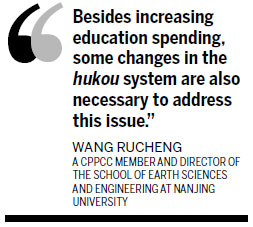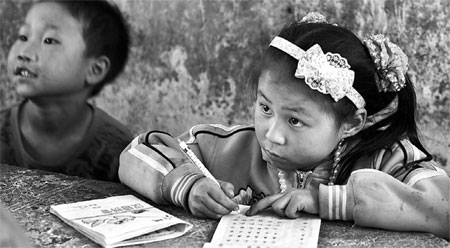More efforts for equal education
Updated: 2013-03-21 07:09
By Hu Haiyan (China Daily)
|
||||||||
|
A girl attends a class at a rural school in Bijie, Guizhou province. China's education authority said the country will make more efforts to improve fairness in education. Peng Nian / for China Daily |

China needs to put more effort into improving fairness in education, despite the remarkable achievements that have been made over the past few years, said Minister of Education Yuan Guiren.
"We have made a lot of progress in improving fairness in education in recent years. For instance, free nine-year compulsory education was made universal across the nation by the end of 2011, a significant achievement for the nation," Yuan said during a group discussion at the annual session of the 12th National Committee of the Chinese People's Political Consultative Conference, which was held early this month.
"Ensuring education fairness is very important for the sound development of a nation's education system. We will further promote fairness in education across the nation. My dream is to ensure that we can teach students in accordance with their aptitudes, provide education for all people without discrimination and cultivate every person in this nation to become a talent," said Yuan.
Government education expenditure hit 7.79 trillion yuan ($1.25 trillion) over the past five years, with an average annual increase of nearly 21.6 percent, according to the Government Work Report for 2013 delivered by former premier Wen Jiabao during the opening of the first session of the 12th National People's Congress. The expenditure accounted for 4 percent of the nation's GDP in 2012, the report said.
The priority for educational resource allocation goes to the rural, remote, poor and ethnic areas, the report said.
About 160 million students have benefited from free nine-year compulsory education, and a three-year action plan for preschool education was carried out. The shortage of preschools was eased, according to the report.
The system of State financial aid for students has also been improved, with the establishment of a mechanism to give students from poor families financial aid from preschool through graduate school. About 100 billion yuan was spent annually for this purpose, assisting about 80 million students.
The report also said the policy of tuition-free secondary vocational education has been implemented for all rural students and all urban students who study agriculture-related majors or are from poor families.
Despite the encouraging achievements, Yuan pointed out that some areas leave much to be desired, such as in bridging the gap between the quality of education in urban and rural areas, and between key schools and ordinary schools.
"The free nine-year compulsory education only ensures that every child can receive an education. We see some people paying extra fees for their children to be admitted to key schools, which results from the disparity of educational quality in different areas," said Yuan.
Besides bridging the quality of education among different areas, it is also important to provide equitable opportunities for education to migrant workers' children to ensure fairness, political advisers suggested.
According to the Government Work Report, the problem of providing compulsory education to children of rural migrant workers in cities was basically solved, and 12.6 million children with rural residence status are now receiving compulsory education in cities.
Yin Jie, a CPPCC National Committee member and deputy director of the Shanghai Municipal Education Committee, said there is progress, yet it is still far from enough to ensure equitable education opportunities for these children.
"Take the current national college entrance exam for instance. The current exam system is unfair as the admission requirements for the exam vary a lot across the nation. It also discriminates against migrant workers' children," said Yin.
Wang Rucheng, a CPPCC National Committee member and director of the School of Earth Sciences and Engineering at Nanjing University, said providing equal education opportunities for migrant workers' children is of vital importance for society to develop in a harmonious and sustainable way.
"Besides increasing education spending, some changes in the hukou system are also necessary to address this issue," said Wang.
China's hukou system, or household registration system, poses restrictions for children attending schools outside their home provinces.
In 2003, the restriction was amended to allow migrant workers' children to receive nine-year compulsory education in cities where their parents work.
However, under the restriction, migrant children still had to return to their home provinces for further education or risk dropping out of school if they chose to stay with their parents.
Zhong Binglin, a CPPCC National Committee member and president of Chinese Society of Education, pointed out that it is impossible for the restrictions on migrant workers' children to be removed in the short term, as there is conflict between increasing migrant populations and shortage of education resources.
huhaiyan@chinadaily.com.cn
(China Daily 03/21/2013 page4)

 In Photos: 7.0-magnitude quake hits Sichuan
In Photos: 7.0-magnitude quake hits Sichuan
 Li Na on Time cover, makes influential 100 list
Li Na on Time cover, makes influential 100 list
 FBI releases photos of 2 Boston bombings suspects
FBI releases photos of 2 Boston bombings suspects
 World's wackiest hairstyles
World's wackiest hairstyles
 Sandstorms strike Northwest China
Sandstorms strike Northwest China
 Never-seen photos of Madonna on display
Never-seen photos of Madonna on display
 H7N9 outbreak linked to waterfowl migration
H7N9 outbreak linked to waterfowl migration
 Dozens feared dead in Texas plant blast
Dozens feared dead in Texas plant blast
Most Viewed
Editor's Picks

|

|

|

|

|

|
Today's Top News
Live report: 7.0-magnitude quake hits Sichuan, heavy casualties feared
Boston suspect cornered on boat
Cross-talk artist helps to spread the word
'Green' awareness levels drop in Beijing
Palace Museum spruces up
First couple on Time's list of most influential
H7N9 flu transmission studied
Trading channels 'need to broaden'
US Weekly

|

|








